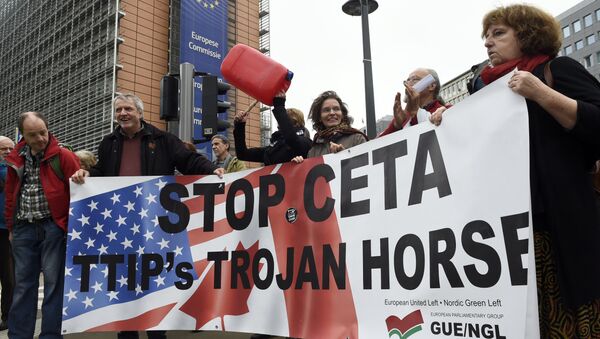The election of Donald Trump and the unpopularity of free trade deals are signs that globalization is in crisis, economic analyst Juergen Maier of the Environment and Development Forum told Sputnik Deutschland.
"TTIP is on ice, CETA is yet to be approved by 27 national parliaments in the EU – whether it will be is questionable – and other agreements such as the TPP in the US have been officially canceled," Meier said.
"One can say that the form of globalization we have experienced so far is in a crisis. That this has only had impact on the climate of discussion, not really on the real flows of the world economy, is a completely different question."
There are "relatively few winners of this globalization and a lot of losers," Maier said.
For ordinary people, this "globalization of the corporations" has the effect of encouraging global competition that increases downward pressure on wages and prices, for example on agricultural production.
"A world market for smartphones definitely makes sense, but do we need a world market for milk or pigs? Of course we don't need that. This is exactly the difference between the alternatives we are discussing at our conference and what is being discussed at the G20 Summit or the Davos World Economic Forum."
Maier said that increasing protectionism, enthusiasm for border controls and nationalism, as demonstrated by the election of Trump and the UK's Brexit vote, is leading to the success of right-wing parties and the failure of progressive parties to adjust to the new reality.
"They often act as if they are also against this sort of globalization, but whenever they are in power – like Mr. Tsipras in Greece or the Red-Green governments of Sweden and Luxembourg – they suddenly agree to everything. I think that above all, a lot of people are quite rightly angry. Social Democrats really have to ask themselves why the working class is voting so strongly for right-wing populism, which has to do with the policy failures of social democracy."
"It doesn't matter who wins in France, even Mr. Macron is beginning to understand that this can't go on, and Italy thinks so too. The G20 can only make unanimous decisions, so there may well be no decision. However, ultimately it may be no bad thing that there is such diversity of opinion. That's why it must be made clear at the G20 summit that the age of one single liberal economic doctrine is over. Today, people need alternatives, and politicians need to deliver them," Meier said.





